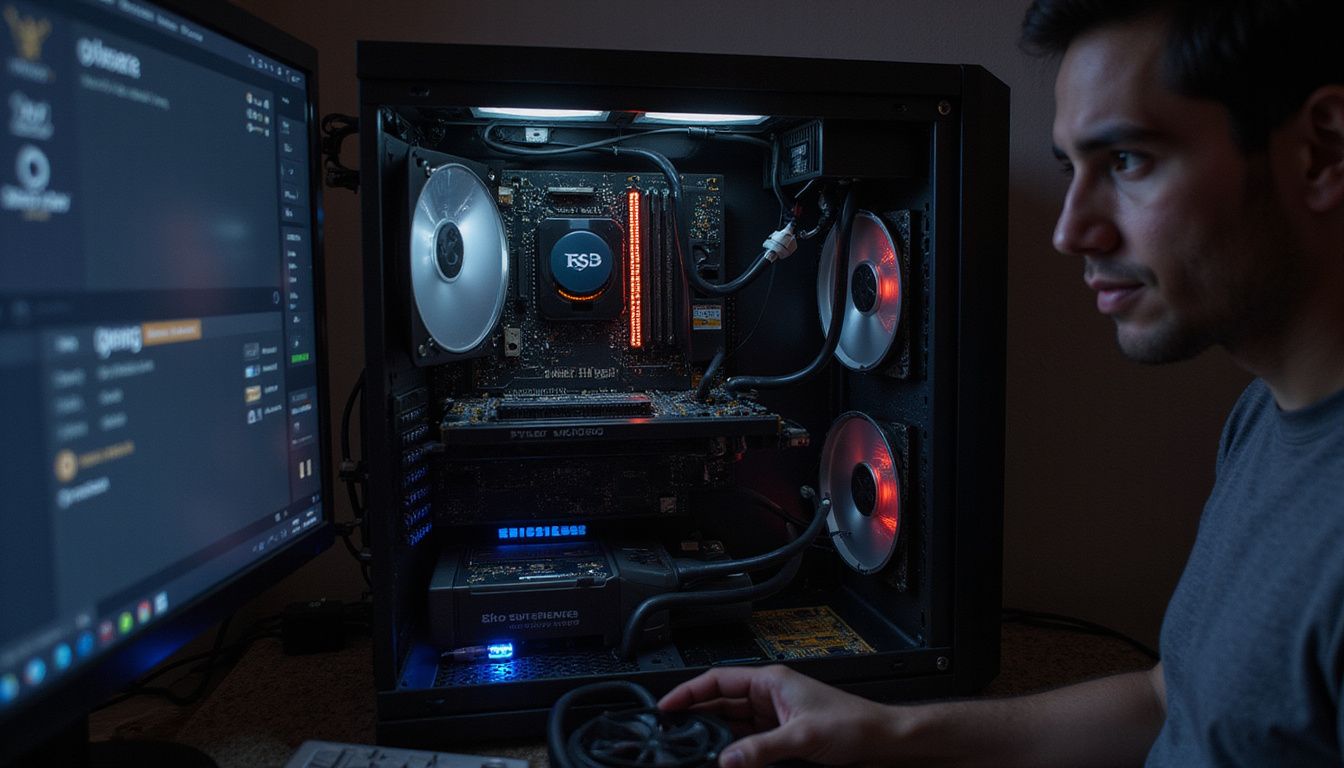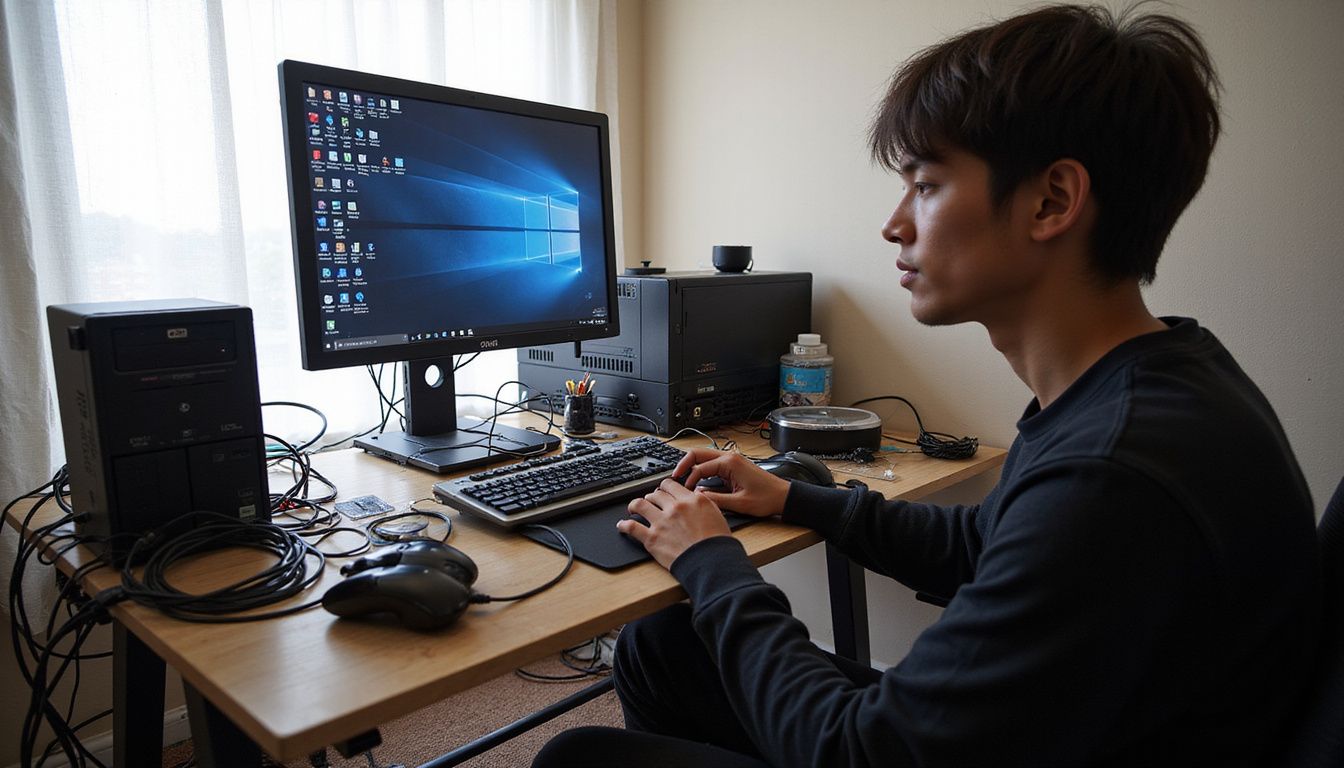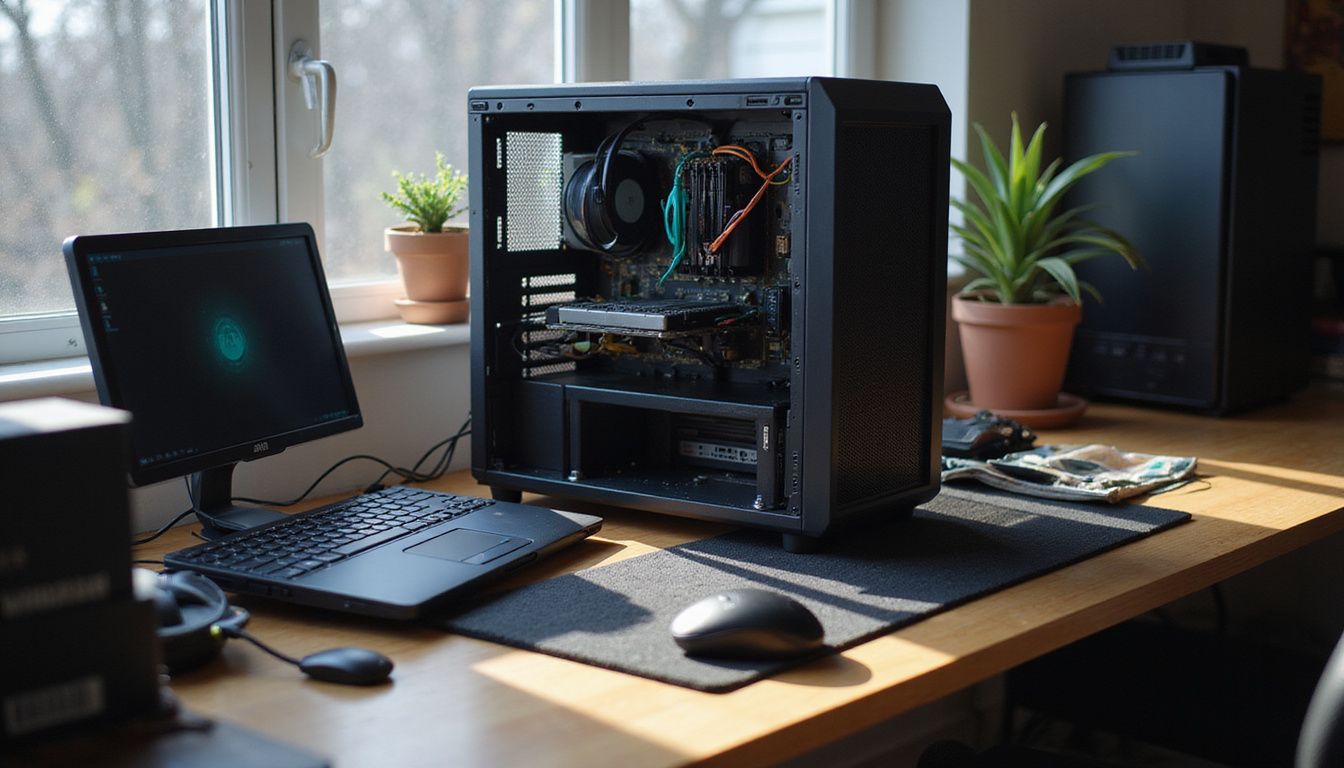Tired of lag ruining your best gaming moments? By 2025, VPS hosting will offer a cost-effective choice for gamers needing powerful and scalable server performance. In this “VPS vs game server” guide, you’ll learn which hosting solution can deliver smooth gameplay without delays or freezing screens.
Read on to pick the right option for your lag-free future in gaming.
Key Takeaways
VPS hosting starts at around $9.95 a month, giving you a solid balance between affordable shared hosting and expensive dedicated servers.
Game servers typically run from $3 up to $70 monthly, depending on the specific game and number of players you have.
A VPS lets you fully control your server setup—meaning you can easily install special mods or features regular game hosts won’t support.
By around 2025, hybrid setups will blend VPS convenience with dedicated server speeds to cut down on lag.
Your gaming server’s location makes a big difference, so choose one close to your players for smoother performance.
Table of Contents
What Is a VPS?
A Virtual Private Server (VPS) lets you carve out your own space on a physical server through smart, efficient partitioning. This setup provides dedicated computing power without the price tag of a full, standalone machine.
The key lies in a hypervisor—a handy piece of software—that divides a single physical server into independent virtual machines. Each virtual machine runs separately without interfering with the others.
Each VPS Australia server behaves just like a private computer, providing guaranteed resources.
I’ve personally set up several VPS environments—mainly to test game servers—and found them reliable, affordable, and incredibly flexible. Prices begin at just $9.95 monthly for managed plans, hitting the ideal cost midpoint between basic shared hosting and expensive dedicated servers.
With your own VPS, you control everything—operating system selection, software installation, and which network ports stay open or locked down—to fit your needs exactly.
What Is a Game Server?

Game servers provide digital spaces where players connect and enjoy multiplayer games. These online environments manage game logic, player moves, and data storage, ensuring your gameplay stays smooth and enjoyable.
Quality servers rely on powerful hardware—typical setups include multi-core processors, at least 8GB RAM, and speedy SSD drives for faster load times. Network quality also makes a big difference, and many rely on dedicated network cards running speeds of 1Gbps or more, minimizing lag.
Unlike standard web servers, game servers handle instant player interactions—not simply serving web content.
The right game server doesn’t just host your game – it transforms your multiplayer experience from frustrating to fantastic.
Hosting costs vary widely, starting around $3 a month for basic configurations but climbing above $70 monthly for high-end servers supporting dozens of gamers or demanding titles. Serious gamers usually pick specialized servers instead of general hosting because they perform better in gaming scenarios.
Game server software actively links players’ actions with each game client, ensuring every gamer views an identical environment at the same moment. This client-server connection forms the foundation for vibrant online gaming communities found on popular platforms like Steam and Epic Games.
Key Differences Between VPS and Game Server

VPS and game servers differ in ways that impact your gaming speed, control, and costs – let’s explore how each option stacks up for lag-free gaming and which might serve you better as cloud hosting evolves through 2025.
Hosting Flexibility

VPS hosting puts players fully in charge of their game server environment. You can pick your own operating system, install unique game mods, and adjust network settings to boost performance.
This control is perfect for dedicated gamers who prefer special mods or running several servers from one device. With a virtual private server, unlike shared hosting, you decide exactly how to distribute system resources.
Game-hosting services offer simpler setups designed specifically for gaming. Providers like ScalaHosting offer managed VPS options starting at just $9.95 per month, handling all the technical details behind the scenes.
These solutions come ready-made for certain games, optimized right out the box. The trade-off is pretty straightforward—you get greater flexibility with VPS hosting, but it requires more technical skills.
Game-specific servers offer easier, instant setups, but with fewer options to customize.
Resource Allocation

Game servers and VPS hosting manage resources differently. A VPS gives you dedicated CPU, RAM, and storage, stable regardless of other users’ activity. This clear division means gameplay stays smooth, avoiding annoying lag from another user’s heavy usage.
On the other hand, game server setups typically adjust resources on the fly, shifting extra power to manage busy periods smoothly. The purpose of a VPS server is to offer higher specs than standard shared hosting, providing guaranteed performance levels you control.
Pro gamers often choose VPS since they can quickly scale resources if their games suddenly become popular.
Virtual machine tech divides physical servers into smaller, independent units, each running its own operating system. This virtual setup creates an ideal testing space, perfect for trying out games before publishing them live.
Managed VPS hosting adds another layer—dedicated resources that speed up gaming applications and reduce delays. Cloud services like Amazon EC2 offer flexible resource management, easily handling shifts in player numbers at different hours.
Scalability
 Scalability sets VPS apart clearly from dedicated gaming servers. With a VPS, you can boost CPU performance, memory, or storage space—all with just a couple clicks. That matters big-time for gamers, especially if player numbers spike suddenly, causing lag.
Scalability sets VPS apart clearly from dedicated gaming servers. With a VPS, you can boost CPU performance, memory, or storage space—all with just a couple clicks. That matters big-time for gamers, especially if player numbers spike suddenly, causing lag.
Your virtual machine can smoothly shift from hosting a cozy Minecraft village to handling huge MMO battles instantly, without hardware changes or downtime.
The true power of VPS lies in its elasticity – the ability to scale up during peak gaming hours and scale down when players log off.
Virtual Private Servers also work great for testing, letting you quickly run several game instances at once. With cloud-based hosting, you’ll pay only for resources actually used—perfect for gaming projects with shifting demands or expanding user groups.
Unlike physical hardware, VPS setups easily adjust through straightforward dashboard controls, adapting perfectly to your specific needs.
Cost Comparisons

Scalability varies between these hosting options, but cost typically decides the best choice for most gamers. VPS plans occupy a comfortable spot in the pricing range. Managed VPS hosting starts around $9.95 per month, making it easier on your wallet than fully dedicated servers.
Game hosting usually costs between $3 and $70 monthly, depending on your chosen game and the number of players supported.
Prices for VPS hosting depend directly on resources—like RAM, CPU cores, and storage—each affecting your monthly bill. Many providers let you pay strictly for usage, unlike fixed-rate game server plans.
For smaller gaming groups or test setups, a basic VPS can save cash. Larger gaming communities may get better value from dedicated game servers, despite their higher initial price tags.
Web hosting providers often include software licenses with game server plans, a bonus you’d typically pay extra for on self-run VPS setups.
Benefits of Using a VPS for Gaming

VPS servers give gamers total control over their gaming setup with options to install custom mods and server tools. You can boost your gaming experience with a VPS by adding more RAM or CPU power when needed, unlike fixed shared hosting plans.
Customization Options

Gaming on a VPS offers greater control than regular game servers ever could. You gain full root access, letting you tweak every detail of your server setup. Just last month, I installed custom Minecraft mods on my Linux VPS—mods regular game hosting didn’t allow.
Plus, you can freely adjust CPU cores, RAM amounts, and storage space to make sure your games run exactly as you like.
The perfect gaming server isn’t about raw power—it’s about having the right resources in the right places.
With a virtual machine, installing specialized software and applications is simple, giving your games the exact support they need. This matters especially for titles requiring unique databases or web services.
Since a VPS allows flexible resource allocation, you can easily direct more power to demanding games. Standard game hosts often trap you in fixed settings, but virtualization helps you effortlessly switch among multiple games—without the annoying lag common on traditional shared servers.
Better Performance Than Shared Hosting
VPS hosting gives gamers a big advantage over basic shared hosting. You get dedicated resources allocated specifically to you—meaning games run smoother, without neighbors hogging your CPU power.
With a virtual private setup, you’re isolated from other users on the same physical server. That means your CPU cycles, RAM, and storage stay completely yours. Plus, most modern VPS plans offer SSD storage, speeding up read and write times—this leads to shorter load screens and fewer annoying lag spikes during critical gameplay moments.
With VPS, you can host more players and support larger worlds, without hitting frustrating resource limits. Stability matters big-time for anyone hosting multiplayer games online. Virtualization tech lets your server handle multiple tasks better than shared hosting does—you can run your game server and even web apps smoothly at the same time.
Many gaming enthusiasts notice an immediate improvement after switching from shared to virtual private hosting. Those random crashes and annoying slowdowns plaguing basic shared plans often disappear right away.
Sure, you’ll face a bit of a learning curve at first, but it’s totally worth it for faster and smoother gaming performance.
Drawbacks of Using a VPS for Gaming

VPS gaming comes with a steep learning curve that scares off casual players. You need skills in Linux commands, network setup, and server configs to avoid game lags and crashes.
Technical Knowledge Requirements
Setting up your own gaming VPS can be pretty tough if you’re not tech-savvy. You’ll have to deal with command lines, Linux basics, and tricky server configurations. Most casual players get lost quickly while trying to handle these commands.
Once, I spent over three hours setting up my first Minecraft server—just because I overlooked one small line in the config file.
Luckily, lots of providers today offer friendly server tools, like cPanel, to simplify things. These simple control panels help you manage your server without stressing over complex commands.
Each virtual game server setup also involves tackling network issues, ports, and firewall rules. Since every game works a bit differently, a small setup mistake can cause big issues like laggy play or random disconnects.
Many VPS providers now have easy-to-follow guides for popular games such as Minecraft and CS:GO. Cloud platforms, like Amazon Web Services, offer handy tools for checking server speeds and connection health, but you’ll need basic skills to understand the info they provide.
Without correct setup—no matter how powerful your server is—multiplayer gaming will still suffer.
Potential Game Lags
Technical skills aren’t your only challenge in VPS gaming—lag is often the bigger issue. Even with a strong virtual machine, lag can still spoil your gaming fun. VPS networks typically aren’t built for the rapid movement of fast-action games.
Personally, I’ve watched ping rates shoot up from 30ms to nearly 150ms during busy evening hours on my unmanaged VPS. Your provider’s network setup directly shapes how smoothly your games run.
Another problem is limited resources. High-demand games usually need more computing muscle than basic VPS plans can deliver. Server location makes a huge difference too—farther away means more delay and worse lag.
Gamers who pick VPS servers far from their own city deal with delays, and these delays can ruin competitive matches. Picking the right VPS settings might help lower lag—still, it won’t remove every network delay that dedicated gaming servers naturally avoid.
When to Choose a VPS vs. a Game Server

Your gaming preferences will shape your server choice. VPS hosting fits nicely with small groups of gamers or for running simple test servers. Last year, I used ScalaHosting to set up my Minecraft server, playing smoothly for $9.95 a month with around 10 friends.
VPS hosting lets you easily boost RAM and CPU resources as your player numbers grow—ideal for gaming sessions with shifting player loads.
Dedicated game servers suit larger gaming communities, competitive gaming leagues, or bigger online events. These dedicated setups deliver maximum performance right from the start, without needing advanced computer skills.
Unlike shared hosting, VPS hosting guarantees specific resources—preventing lag from other customers on the same hardware. A dedicated server usually comes with a simple control panel, while VPS solutions require comfort with basic operating systems and network tools.
Your tech knowledge and monthly budget play key roles too, as a VPS costs less but requires extra skill to manage.
VPS vs. Game Server: How Will the Landscape Change in 2025?

Gaming servers are set to get a big boost by 2025, with faster performance for both VPS and game-specific hosting. Dedicated game servers will likely continue to dominate multiplayer experiences, especially for competitive gamers where every millisecond matters.
Esports athletes, in particular, depend on rapid and seamless server responses during intense tournaments. With the rise of competitive gaming, demands for low-lag gameplay will drive further tech improvements.
Server locations will matter even more in the years ahead. Players spread across various regions need nearby servers to guarantee fast gameplay and top performance. Although cloud services and virtual hosting will drop in price, dedicated game servers will remain the leader for reliable speed and reduced latency.
To meet growing demand, many hosting providers will introduce hybrid setups—combining smooth VPS-style flexibility with dedicated server performance. These hybrid systems will leverage improved networking hardware and optimized operating systems to cut lag significantly, compared to the typical home setup of hosting a server on my PC.
People Also Ask
What’s the main difference between a VPS and a game server?
A virtual private server (VPS) splits one physical computer into separate virtual machines. Game servers typically rely on dedicated hosting—specialized hardware made to handle lots of players without slowing down or causing lag.
Can Amazon Web Services host gaming servers?
Yes, Amazon’s Elastic Compute Cloud (EC2) supports hosting game servers. EC2 manages heavy computing tasks in the cloud, handling games smoothly online and providing strong performance.
Do I need special operating system skills to handle a gaming server?
Having some basic OS knowledge is helpful—but many providers give you simple, user-friendly control panels. Most hosts offer either Windows 10 Pro or a Linux version, depending on your game’s needs.
Can I use a VPS to host a webserver and game server at once?
Yes, a VPS lets you multitask easily by dividing resources between tasks. If your virtual server has enough power, you can comfortably host a web app, run forums, and handle a game server—all together.
How can server clusters boost gaming performance?
Server clusters link multiple computers into one powerful network. This helps reduce lag at busy times by sharing player traffic evenly among all connected servers, instead of crowding a single machine.
References
https://www.serverion.com/articles/vps-vs-dedicated-server-which-to-choose-in-2025/
https://hostadvice.com/vps/gaming/ (2025-03-31)
https://www.liquidweb.com/gaming/
https://www.scalahosting.com/blog/is-a-vps-good-for-gaming/
https://www.scalahosting.com/blog/managed-vps-hosting-for-gaming-from-lag-to-brag/
https://www.hostingseekers.com/blog/vps-hosting-for-gaming-optimizing-performance-for-gamers/ (2023-09-22)
https://www.liquidweb.com/help-docs/dedicated-vs-listen-server/
https://www.bitcatcha.com/web-hosting/game/
https://truehost.com/is-vps-hosting-good-for-gaming-servers/
https://egamersworld.com/blog/best-vps-for-gaming-in-2025-ca9Z1cTpCn
